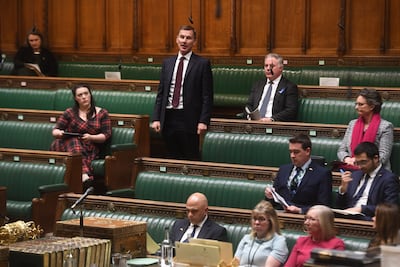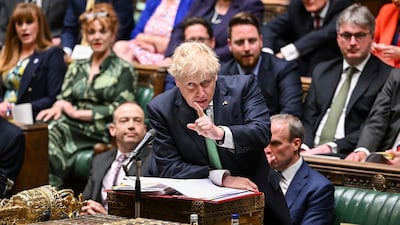UK Prime Minister Boris Johnson might believe he has won his battle for survival by claiming victory in the no-confidence vote called by his Conservative party colleagues. But this does not guarantee an end to the war being waged by his parliamentary rivals over their choice for prime minister.
The no-confidence vote was held at the House of Commons on Monday evening, after 54 Conservative MPs said they could no longer support Mr Johnson remaining in office as a result of his involvement in the so-called “partygate” scandal that has rocked Westminster in recent months.
While Mr Johnson’s political opponents believed there was sufficient disquiet among Conservative MPs to win a majority in the vote that would have removed Mr Johnson from Downing Street, in the end the Prime Minister won a comfortable majority, one that should enable him to remain in office for at least another year.
But even though Mr Johnson won 211 votes from the 359 sitting Tory MPs, giving him around 60 per cent of the ballot, his political foes insist that it amounted to little more than a Pyrrhic victory, as it means that at least 40 per cent of his MPs no longer have confidence in him remaining as their leader.
The recent history of no-confidence votes on sitting Conservative prime ministers certainly suggests that Mr Johnson is not in the clear despite his win. Both Margaret Thatcher and Theresa May won no-confidence votes in their premierships, only to be removed a few months later.
Consequently, Mr Johnson’s Conservative opponents insist their campaign to remove him from office will continue, claiming that they aim to have him out of Downing Street by the summer.
Even so, Mr Johnson’s characteristically bullish performance since winning the vote on Monday night suggests that, far from being fatally wounded by the experience, he believes his victory has given him a new lease of political life, one that he intends fully to use to implement his political agenda.
Addressing the first Cabinet meeting held in the immediate aftermath of the vote, Mr Johnson urged his ministers to draw a line on the issue, and focus their attentions instead on addressing the many challenges facing the country, from the soaring cost-of-living crisis to the war in Ukraine, where Mr Johnson is emerging as something of hero among Ukrainian leaders.
The deep regard the Ukrainians have for the British leader has even resulted in him being officially inducted into the country’s Cossack community, giving him a new name that pays homage to his hairstyle and tribute to his support for the Ukrainian war effort. A Cossack community in Chernihiv, in northern Ukraine, gave the Prime Minister the name of Boris Chuprina, which means “a long lock of hair”. When asked why this particular name, a spokesman for the region explained: “Why Chuprina? You can see that he has such a freedom-loving haircut, which underlines his personality, his strong will.”

Mr Johnson will certainly need to demonstrate his strength of character, as well as his political acumen, if he is to survive the treacherous months ahead, with opponents on both sides of the political divide seeking to remove him from office. The political wounds inflicted on Mr Johnson by the no-confidence vote were best summed up by Scottish National Party leader Ian Blackford during Prime Minister’s Questions at the Commons this week when he denounced Mr Johnson as being a “lame duck”.
But while it is undoubtedly true that Mr Johnson is by no means out of the woods yet, the fact that his opponents have yet to rally around a credible candidate to replace him gives him a fighting chance of overcoming the odds and remaining in office. Normally when a no-confidence vote is held, it is because opponents of the incumbent prime minister have rallied behind a rival candidate.
Back in 1990, when Thatcher, the Conservatives’ most successful post-war prime minister, was unceremoniously dumped out of office, it was Michael Heseltine who emerged as her favoured successor, even though ultimately he failed in his bid for the premiership, which was eventually won by the relatively unknown John Major.
The campaign to unseat Ms May from office in 2019 over her hapless attempts to revolve the Brexit issue was rather more clear cut, as Mr Johnson, having resigned from his position as foreign secretary in protest at her handling of the Brexit negotiations, was the clear-cut favourite to replace her.
The fact, therefore, that Mr Johnson’s Conservative opponents have failed to identify a clear-cut candidate to replace him is very much to the Prime Minister’s advantage, as it would be an act of political suicide for the Conservatives to ditch their leader without having a viable candidate to replace him. Such a move at a time when the British nation is struggling to cope with numerous domestic crises would be seen as an act of self-harm, one that would surely see the Conservatives removed from power at the next general election, which is due to be held by 2024 at the latest.
The challenge, therefore, for Mr Johnson’s opponents is to give their backing to a candidate who has the qualities to be a credible alternative to the current incumbent. In this context, by far the most likely candidate to mount a challenge is former foreign secretary Jeremy Hunt, who is widely regarded as having organised the no-confidence vote. Mr Hunt stood as a rival against Mr Johnson during the 2019 contest to find a successor to Mrs May, but was heavily defeated because, unlike Mr Johnson, he opposed Britain’s decision to leave the EU and, at the time, the party believed it needed a leader that could deliver Brexit, which is why Mr Johnson won the ballot so convincingly.
Three years later, Mr Hunt and his supporters believe that this is no longer an issue, especially as Mr Johnson’s handling of the Brexit negotiations has left a number of key issues, such as the future of the EU’s trading relationship with Northern Ireland, unresolved. It remains to be seen whether Mr Hunt will formally declare his intention to make a direct challenge for the premiership. But one thing is guaranteed – the Boris Johnson drama is set to run for many months to come.


